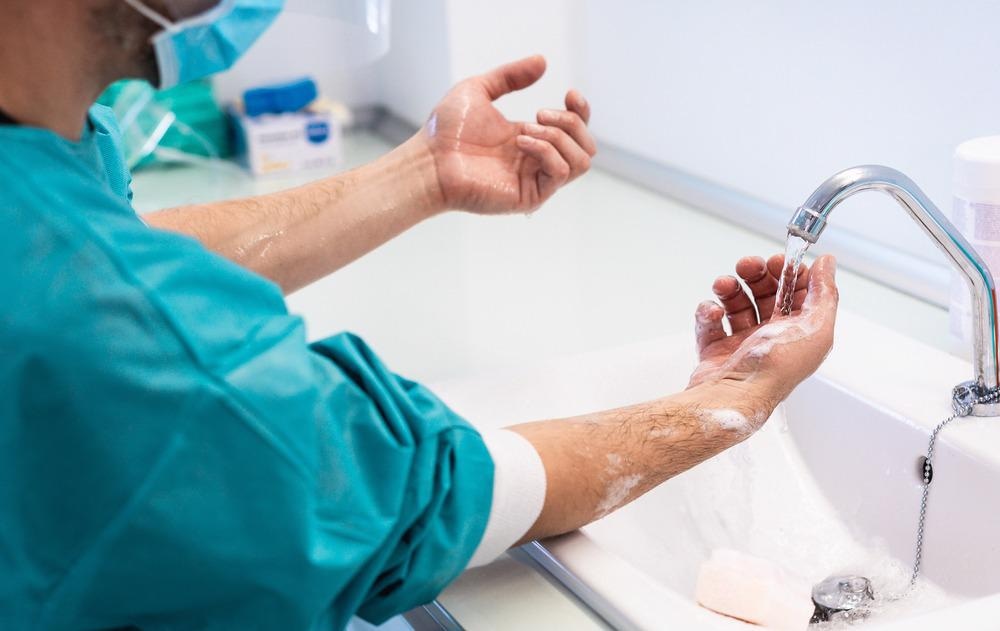The majority of germs that cause serious infections in humans are transmitted by people’s actions. One of the effective means to prevent these infections is by practicing good hand hygiene. Several studies have indicated that healthcare providers clean their hands less than half of the time they should. This causes the transmission of healthcare-associated infections among hospitalized patients.
It is extremely important to prevent the spread of germs, especially, in hospital settings, healthcare-related facilities, such as dialysis centers, nursing homes, and general public places (e.g., gyms, shopping complexes, etc.).

Image Credit: DisobeyArt/Shutterstock.com
A Brief History of Hand Hygiene
In the 19th century, the concept of handwashing while taking care of patients surfaced. Labarraque offered evidence that showed hand decontamination could significantly reduce the incidence of puerperal fever and maternal mortality. In 1840, the Great hospital in Vienna contained two maternity clinics. The first clinic was taken care of by medical students, who many times came directly to the delivery suite from autopsy rooms and the average maternal mortality rate due to puerperal fever was about 10 percent. On the contrary, the other clinic, which was attended by midwives, showed a significantly reduced maternal mortality, i.e., only 2 percent.
Ignaz Philipp Semmelweis, the pioneer of antiseptic procedure, observed this difference across both the clinics and instituted the policy of washing hands with chlorinated lime for those leaving the autopsy room. Practicing this rule resulted in a drop in the rate of maternal mortality tenfold. In 1950, Staphylococcal epidemics occurred and researchers observed that direct contact was the main mode of transmission of Staphylococcus aureus in nurseries. Implementing a rule that required washing hands by patients’ contacts, significantly reduced the rate of infection in babies.
In 1995, the Hospital Infection Control Practices Advisory Committee (HICPAC) advocated the use of antimicrobial soap or a waterless antiseptic agent, for sanitizing hands, after leaving the patients’ rooms infected with multidrug-resistant pathogens. In 2008, Global Handwashing Day was observed and in 2009 the World Health Organization launched a program linked with patients’ safety called “SAVE LIVES: Clean Your Hands”.
Healthcare Providers and Hand Hygiene
According to a recent report, thousands of people across the world die from infections acquired while receiving healthcare. Hygiene is one of the easiest, nonetheless, an important means to reduce the spread of diseases and infection. It is particularly important for healthcare professionals, such as nurses, doctors, and healthcare technicians, who are in direct contact with patients.
Two types of microorganisms colonize hands, resident flora, and transient flora. Common pathogens found on the hands of healthcare providers, such as methicillin-resistant Staphylococcus aureus (MRSA), vancomycin-resistant Enterococcus (VRE), MDR-Gram Negative bacteria (GNBs), Candida spp., and Clostridium difficle, can survive for more than 150 hours. In the current coronavirus disease 2019 (COVID-19) pandemic, caused by the highly contagious severe acute respiratory syndrome coronavirus-2 (SARS-CoV-2) virus, the importance of handwashing has been recognized across the globe.
The Centre for Disease Control and Prevention (CDC) has focussed on improving healthcare provider adherence to hand hygiene recommendations. The vision is to address all the misconceptions related to hand hygiene and empower patients to take an active role in reminding healthcare providers to clean their hands appropriately. Typically, healthcare providers are required to clean their hands as many as a hundred times in a twelve hours shift, based on the number of patients admitted and the intensity of care.
How Effective are Hand Sanitizers?
Cleaning hands by rubbing alcohol-based formulation is an effective hand sanitizing technique if the hands are not visibly soiled. This method is faster and better tolerated compared to washing hands with soap and water. Alcohol-based hand sanitizers can kill most germs and are one of the most preferred methods of maintaining hand hygiene. However, it fails to kill Clostridioides difficile, a bacterium that causes life-threatening diarrhea, which has been identified as a common healthcare-associated infection.
Patients infected by this bacterium must wash their hands with soap and water, and healthcare providers should always remember to wear gloves while treating these patients. However, alcohol-based sanitizers have proved to be more effective and do not create antibiotic-resistant superbugs. It is important to wash hands with soap and water when visibly contaminated with blood or other body fluids, and proteinaceous material.

Image Credit: Mix and Match Studio/Shutterstock.com
Proper Hand Hygiene and Methods for its Improvement
It is important to remove jewelry before washing hands, preferably, in warm running water. One must lather with soap using friction, and wash all hand surfaces and fingers thoroughly. It is recommended to pat dry the hand as frequent rubbing could crack the skin. As stated above, alcohol is the preferred hand-sanitizing product, which is effective against many microbes and is less irritating to the skin.
Recent studies have revealed that interactive educational programs, combined with free availability of hand disinfectants, could significantly elevate hand hygiene compliance. In a Swedish hospital, a single lecture on basic hand hygiene protocols has significantly enhanced hand hygiene compliance. The availability of pocket carried bottles of hand sanitizers has increased compliance.
Lack of handwashing facilities, such as the installation of sinks, running water, and sewage systems, has been a major deterrent to the implementation of hand hygiene. Thereby, implementation of these measures and raising awareness among healthcare providers about hand hygiene is extremely important to prevent the further spread of infection to patients.
References:
- Hand washing and hand hygiene. (2022) [Online] Available at: https://www.nidirect.gov.uk/articles/hand-washing-and-hand-hygiene
- Clean Hands Count for Safe Healthcare. (2020) The Center for Disease Control and Prevention. [Online] Available at: https://www.cdc.gov/patientsafety/features/clean-hands-count.html#:~:text=Hand%20hygiene%20is%20a%20great,patients%20on%20any%20given%20day
- The Importance of Hand Hygiene. (2020) [Online] Available at: https://www.yourworldhealthcare.com/uk/news/the-importance-of-hand-hygiene
- Hand Hygiene: Why, How & When? World Health Organization.[Online] Available at: https://www.who.int/
- Mathur, P. (2011) Hand hygiene: back to the basics of infection control. The Indian journal of medical research, 134(5). pp. 611–620. https://doi.org/10.4103/0971-5916.90985
Further Reading
Last Updated: Feb 23, 2023